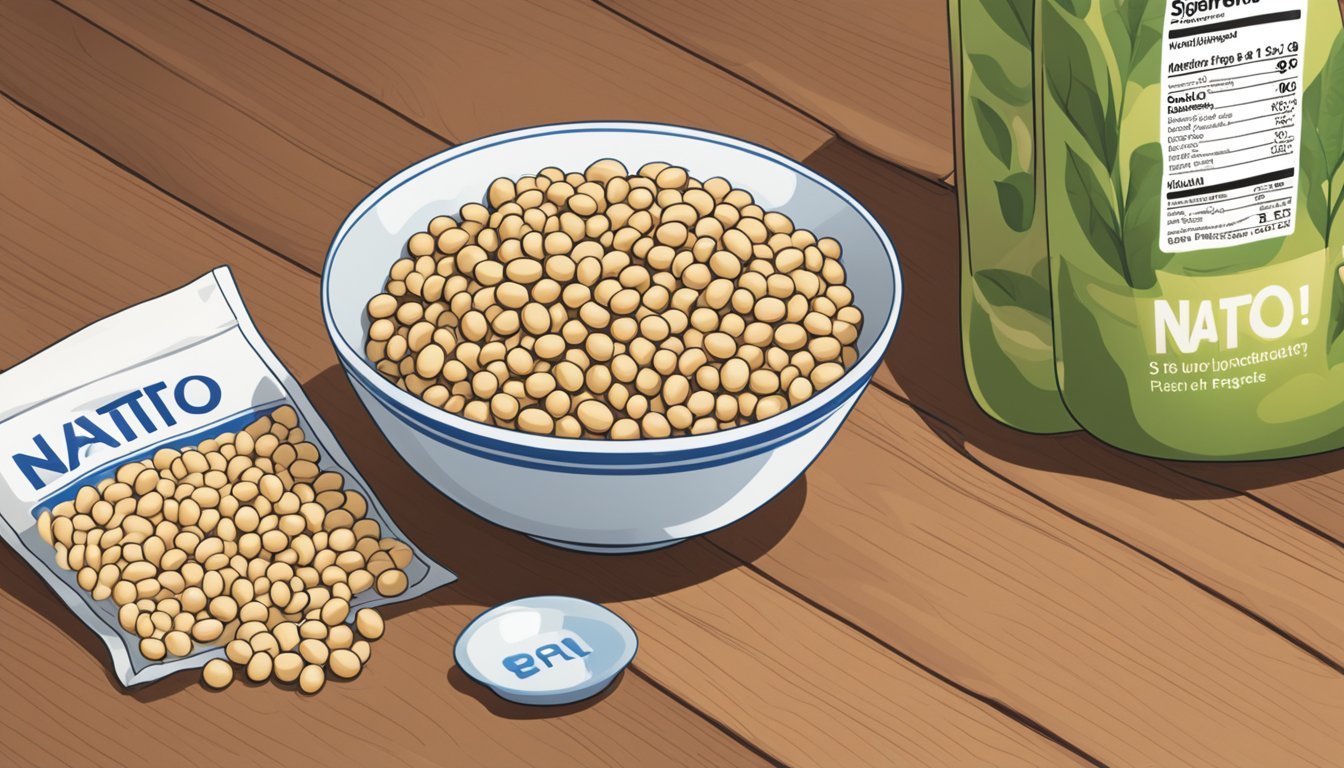Can I Eat Natto While Pregnant?
Understanding the Benefits and Safety
Eating natto during pregnancy is generally considered safe and can be beneficial for both the mother and the developing baby. Natto is a traditional Japanese food made from fermented soybeans, known for its distinct flavor and a nutritional profile rich in protein, vitamins, and minerals. It also contains probiotics that are good for gut health and dietary fibers that can aid digestion. Moreover, natto is a valuable source of vitamin K2, which plays a role in bone health, and its high content of folic acid is crucial for preventing neural tube defects in newborns.
The benefits of natto extend to potentially reducing the incidence of certain conditions in children. Research highlights a lower incidence of eczema in children at six months of age when mothers consume natto regularly during pregnancy. Given that natto is also rich in iron, it can support the increased need for this mineral during pregnancy, which is essential for oxygen transport and preventing anemia in expecting mothers.
However, it is important for pregnant individuals to consider the quality of natto consumed. Unpasteurized or improperly prepared natto could pose health risks, so it is essential to ensure that it has been produced following strict hygiene standards. As with any dietary change during pregnancy, consulting a healthcare provider is advised to determine personal suitability and to receive tailored nutritional guidance.
Understanding Natto: Origin and Nutritional Profile
In this section, readers will gain insights into what natto is and its rich nutritional components that contribute to its reputation as a healthy food choice.
What Is Natto?
Natto is a traditional Japanese food made by fermenting soybeans with Bacillus subtilis. It is known for its strong, cheese-like flavor, pungent aroma, and sticky, slimy texture that may be unfamiliar to the Western palate. Despite its divisive sensory characteristics, natto is deeply ingrained in Japanese culinary culture.
Nutritional Components of Natto
Natto is a nutrient-dense food offering a variety of proteins, vitamins, and minerals. Below is a condensed nutritional profile of natto, illustrating its key health components per 100g serving:
Nutrient Amount Calories 212 kcal Protein 18.1 g Total Fat 11.0 g Saturated Fat 1.6 g Carbohydrates 14.3 g Fiber 5.4 g Sugars 4.9 g Calcium 217 mg Iron 8.60 mg Potassium 729 mg Vitamin C 13.0 mg Zinc 5.3 mg
Natto is particularly rich in vitamin K2, a nutrient essential for bone health. It is also a significant source of plant-based protein and fibers that support gut health. The fermentation process that produces natto generates probiotics, beneficial bacteria that can help to maintain a healthy digestive system.
Health Benefits of Natto During Pregnancy
Natto, a traditional Japanese fermented soybean dish, offers distinct health advantages for both the mother and the developing fetus during pregnancy. These range from providing essential nutrients to reducing risks of certain complications.
Boosting Maternal and Fetal Health
Natto is a nutrient-dense food that is particularly high in folic acid and vitamin K2, both vital for pregnancy. Folic acid supports neural tube development, reducing the baby’s risk of birth defects. Meanwhile, vitamin K2 is essential for bone health, benefiting both the mother and fetus. Additionally, natto contains significant levels of iron, which is crucial in preventing anemia by aiding in the production of hemoglobin. The dish also provides calcium, necessary for the developing fetal skeleton and maintaining the mother's bone density.
Moreover, natto harbors beneficial bacteria that can enhance gut health, potentially easing constipation, a common issue during pregnancy. These probiotics contribute to a healthy microbiome which is important for the mother's well-being and the baby's developing immune system.
Role in Preventing Complications
Consumption of natto has been associated with a reduced incidence of eczema in children, as some studies suggest maternal intake during pregnancy may have protective effects against this condition. Besides offering benefits for the skin, the properties of natto have been observed in relation to cardiovascular health. The presence of nattokinase, an enzyme found in natto, is known to support healthy blood pressure levels, which is vital during pregnancy to prevent complications like preeclampsia.
Eating natto may also contribute to a reduced risk of heart disease. Its components, specifically vitamin K2 and nattokinase, help to maintain cardiovascular health by potentially reducing blood vessel calcification and improving circulation. While these effects are beneficial for the general population, they are particularly important during pregnancy when the maternal cardiovascular system is under increased stress.
In summary, natto supports maternal and fetal health by supplying key nutrients and may play a role in preventing certain health complications during pregnancy.
Safety Concerns and Considerations
When it comes to consuming natto during pregnancy, understanding the potential risks is crucial for the wellbeing of both the mother and the child. Special consideration should be given to the preparation and cleanliness of the food to prevent food poisoning, and attention should be paid to individual health conditions and allergies.
Raw Foods and Pregnancy Risks
Consumption of raw foods during pregnancy increases the risk of exposure to harmful bacteria that can lead to food poisoning. Pregnant individuals should be cautious as their immune systems are altered, making them more susceptible to infection and its severe implications on the fetus. Natto, while typically fermented, is generally exempt from these risks if it has been prepared properly. It's important to ensure that natto is consumed from a reputable source and is stored and handled according to safety standards to reduce the risk of bacteria such as Listeria contamination.
Possible Allergic Reactions and Digestive Issues
Natto is a soy product, and as such, it can be an allergen for some individuals. Pregnant women who have a history of soy allergies or who develop new sensitivities during pregnancy should avoid natto. Additionally, natto contains high amounts of vitamin K, which can interact with certain prenatal vitamins and medications. It's important to consult a healthcare provider before adding natto to a prenatal diet. Furthermore, some individuals may experience digestive symptoms such as bloating and gas due to the high fiber content in natto. Pregnant women experiencing digestive issues should moderate their intake and may need to avoid natto if symptoms persist.
Incorporating Natto Into the Maternal Diet
Eating natto during pregnancy can be highly beneficial, providing essential nutrients that may support the baby's development and potentially reduce the risk of eczema. It's important for expectant mothers to consider how they can include natto in their diet in both appealing and nutritious ways.
Suggested Serving Ideas
Breakfast: A small serving of natto can be stirred into warm rice, commonly consumed for breakfast in Japan, with a sprinkle of chopped green onions and a drizzle of soy sauce for added flavor.
Snack: Natto can be incorporated into a snack by topping it on whole wheat crackers or mixed into a small cup of plain yogurt.
Combining Natto with Other Healthy Foods
With Vegetables: Toss natto with diced tomato, cucumber, and avocado for a fiber-rich salad that complements the natto's nutritional profile.
With Seafood: Enhance a natto dish by pairing it with omega-3-rich fish like salmon or tuna. This combination not only tastes great but also adds to the prenatal nutrient intake.
With Fruit: For those who prefer a hint of sweetness, adding chopped kiwi or pear to natto can help balance its savory taste and provide additional vitamins.
Natto is a versatile food that can be tailored to fit various meals throughout the day and can be easily paired with a wide range of other ingredients that support a healthy pregnancy diet.
Natto in Comparison to Other Protein Sources
In the context of protein-rich foods suitable during pregnancy, natto stands out due to its unique fermentation process and nutritional profile. It's essential to understand how it compares with other conventional protein sources.
Natto Vs. Other Soy Products
Natto is a fermented soy product known for its distinctive sticky texture and strong flavor. Unlike tofu, another popular soy product, natto is fermented with Bacillus subtilis, which enhances its nutritional value. Specifically, natto provides a complete protein profile, meaning it includes all essential amino acids necessary for the human body.
Protein Content: Natto contains approximately 18 grams of protein per 100 grams.
Tofu, on the other hand, provides about 8 grams of protein for the same amount.
Both tofu and natto offer health benefits, but natto's fermentation process introduces additional probiotic properties, potentially benefiting gut health.
Natto and Plant-Based Protein Alternatives
When considering plant-based protein alternatives, natto compares favorably to other options such as legumes, nuts, and seeds. While chickpeas and peas are good sources of protein, natto surpasses them in protein density.
Chickpeas typically have about 9 grams of protein per 100 grams.
Seeds and nuts vary in protein content, but many provide around 20 grams of protein per 100 grams, with the advantage of also offering healthy fats.
Despite the higher protein content in some nuts and seeds, natto's fermented nature can offer additional health benefits not present in non-fermented foods. It is a versatile component of a balanced diet and particularly noteworthy for those seeking plant-based proteins during pregnancy.
Guidelines for Consuming Fermented Foods
When it comes to the consumption of fermented foods during pregnancy, safety and the benefits of fermentation are paramount. Pregnant women should be well-informed about the right ways to store these foods and understand the implications for both their health and that of their unborn child.
Safety and Refrigeration
Fermented foods such as natto, which contain Bacillus subtilis and other probiotics, are widely believed to support gut health. However, they must be appropriately refrigerated to maintain safety and prevent the growth of harmful bacteria. Women should ensure that fermented food products are:
Stored in the refrigerator immediately after purchase
Kept at or below 40°F (4°C)
Discarded if left out at room temperature for over two hours
Improper handling or contamination of these foods could lead to foodborne illnesses, which have the potential to cause a miscarriage or other adverse pregnancy outcomes.
Understanding Fermentation and Pregnancy
During fermentation, microorganisms such as bacteria, yeast, or fungi convert organic compounds – like sugars in soybeans when making natto – into alcohol or acids, creating a rich source of probiotics. These beneficial bacteria can improve gut health and may have positive effects on the mother's wellbeing and potentially on infant sleep duration, as suggested by research.
However, it is important that a pregnant woman consults her healthcare provider before incorporating fermented foods into her diet, especially if she has any pre-existing health conditions or dietary restrictions. While most fermented foods are safe, unpasteurized products can pose a risk and should be avoided to prevent potential health complications during pregnancy.
Addressing Common Pregnancy Diet Concerns
During pregnancy, a woman should maintain a diet that supports fetal development while ensuring her own health. The diet should include avoiding certain substances and monitoring intake of nutrients and weight.
Foods to Limit or Avoid
Alcohol: There is no safe amount of alcohol during pregnancy. Alcohol can lead to fetal alcohol spectrum disorders and other developmental issues.
Raw Eggs: These should be avoided due to the risk of salmonella, which can cause severe illness in pregnant women and potentially harm the fetus.
Unpasteurized Products: Pregnant women should refrain from consuming unpasteurized milk and cheese to avoid bacteria like Listeria, which can lead to miscarriage or stillbirth.
Caffeine: Pregnant women are advised to limit caffeine to less than 200 milligrams per day to reduce the risk of miscarriage and low birth weight.
Monitoring Nutrient Intake and Weight Gain
Supplements: Use supplements recommended by a healthcare provider, such as folic acid to prevent birth defects and iron to support the baby’s growth and development.
Weight Gain: A balanced weight gain is crucial. Over- or under-gaining can lead to complications like preeclampsia or growth issues for the fetus.
Maintaining these dietary practices can significantly contribute to a healthy pregnancy and reduce the risk of complications.
Summary and Final Recommendations
During pregnancy, nutrition is paramount for both the mother's and baby's health. Natto, a fermented soybean product, is a nutrient-dense food that can be beneficial during this time. It is notably rich in vitamins K2 and B12, proteins, and probiotics, contributing positively to prenatal health.
Pregnancy Nutrition Benefits:
Probiotic Content: Supports a healthy gut microbiome.
Vitamin K2: Essential for bone health.
Folic Acid: Crucial for fetal development.
Despite some pregnant women having an aversion to natto due to its strong flavor and texture, alternate consumption methods can be employed:
Natto Powder: Can be sprinkled on other foods, making it a versatile additive.
Mix with Other Ingredients: Incorporating natto into recipes can mask the taste for those with sensitivities.
Women are advised to consult healthcare providers before incorporating natto into their diet, especially if they have soy allergies or other food sensitivities. As a part of a balanced diet, natto can serve as a natural complement to prenatal vitamins—but it should not replace them.
Health Considerations:
Always ensure natto is sourced from reputable suppliers to avoid foodborne illnesses.
Balance natto intake with other fermented foods and a variety of nutrients to support overall health during pregnancy.
In summary, when consumed responsibly and after consulting with a healthcare provider, natto can be a valuable addition to the prenatal diet.









